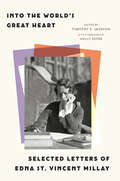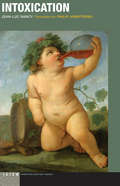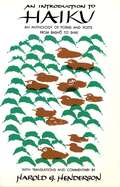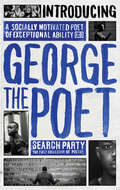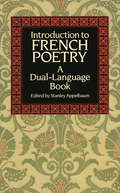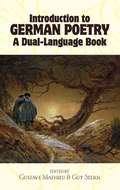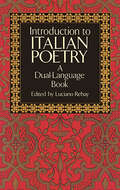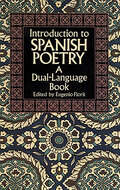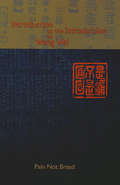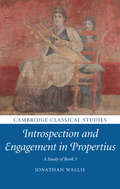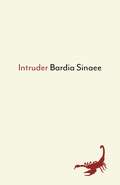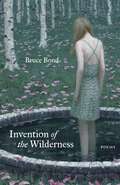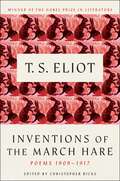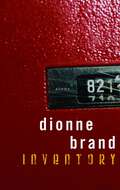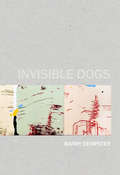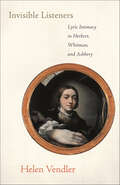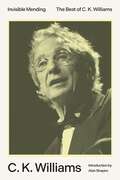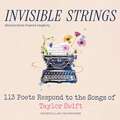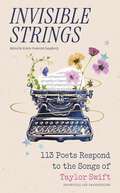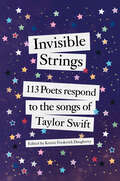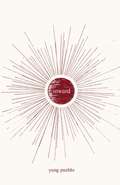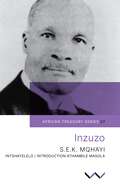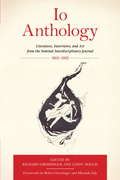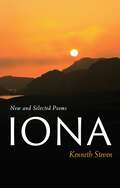- Table View
- List View
Into the World’s Great Heart: Selected Letters of Edna St. Vincent Millay
by Edna St. MillayAn annotated selection of the letters of the Pulitzer Prize–winning poet and playwright Edna St. Vincent Millay, from childhood through the last year of her life Throughout her life, Edna St. Vincent Millay wrote hundreds of letters, which together create a colorful tapestry of her inner life. This selection, based on archival research, represents Millay&’s correspondence from 1900, when she was eight, until 1950, the last year of her life. Through her letters, readers encounter the vast range of Millay&’s interests, including world literature, music, and horse racing, as well as her commitment to gender equality and social justice. This collection, edited by Timothy F. Jackson, includes previously unpublished correspondence, as well as letters containing early versions of poems, revealing new dimensions in Millay&’s creative process and influences. It is enriched by Jackson&’s thoughtful introduction and notes, plus a foreword by Millay&’s literary executor, Holly Peppe. Millay&’s observations on her inner life and the world around her—which speak to contemporary concerns as well—add to our understanding of American literature in the first half of the twentieth century.
Intoxication (Idiom: Inventing Writing Theory)
by Jean-Luc NancyFrom Plato’s Symposium to Hegel’s truth as a “Bacchanalian revel,” from the Bacchae of Euripedes to Nietzsche, philosophy holds a deeply ambivalent relation to the pleasures of intoxication. At the same time, from Baudelaire to Lowry, from Proust to Dostoyevsky, literature and poetry are also haunted by scenes of intoxication, as if philosophy and literature share a theme that announces and navigates their proximities and differences.For Nancy, intoxication constitutes an excess that both fascinates and questions philosophy’s sober ambitions for appropriate forms of philosophical behavior and conceptual lucidity. At the same time, intoxication displaces a number of established dualities—reason and passion, mind and body, rationality and desire, rigor and excess, clarity and confusion, logic and eros.Taking its point of departure from Baudelaire’s categorical imperative to understand modernity—“be drunk always”—Nancy’s little book is composed in fragments, quotations, drunken asides, and inebriated repetitions. His contemporary “banquet” addresses a range of related themes, including the role of alcohol and intoxication in rituals, myths, divine sacrifice, and religious symbolism, all those toasts to the sacred “spirits” involving libations and different forms of speech and enunciation—to the gods, to modernity, to the Absolute. Affecting both mind and body, Nancy’s subject becomes intoxicated: Ego sum, ego existo ebrius—I am, I exist—drunk.
Intro to Haiku: An Anthology of Poems and Poets from Basho to Shiki
by Harold Gould HendersonHarold G. Henderson was, from 1927 to 1929, the Assistant to the Curator of Far Eastern Art at the Metropolitan Musuem of Art. In 1930 he went to Japan, where he lived the following three years. On his return to this country he joined the faculty at Columbia University, where he taught Japanese and initiated a course in the history of Japanese art. He retired in 1955. His published works include The Bamboo Broom, Surviving Works of Sharaku (with Louis V. Ledoux), and A Handbook of Japanese Grammar. He has also translated H. Minamoto's Illustrated History of Japanese Art, etc. Mr. Henderson lives in New York City.
Introducing George The Poet: Search Party: A Collection of Poems
by George the Poet‘The title is Search Party – the idea being that we’re all out here looking for something, and my poems are my way of finding myself.’ A young black poet blending spoken word and rap; an inner city upbringing with a Cambridge education; a social consciousness with a satirical wit and infectious rhythm – George The Poet is the voice of a new generation.Search Party is a thought-provoking and deeply autobiographical collection. From the overtly political ‘Go Home’ to the deeply personal ‘Full-time’; the narrative poems that offer vivid and unapologetic snapshots of inner-city life, such as ‘His Mistakes’, ‘Believer’ and the anthemic ‘My City’; to the provocative social commentary in ‘Lazy Dog’ and ‘YOLO’; to the inspiring, idea-driven pieces such as ‘The Power of Collaboration’ and ‘School Blues’, George takes poetry into new territories and to new audiences, offering a different way to talk about the things that matter, to explore his own experience and ideas, and encourage others explore theirs.George The Poet’s mesmerising and unforgettable live performances have earned him critical acclaim. From sell-out headline gigs and YouTube hits, to recording his own music, and now his first collection of poetry, George uses his work to speak truth to power and challenge our preconceived ideas about the society we’re living in.Whether you’re searching for yourself, for answers, for change – join the search party.
Introduction to French Poetry: A Dual-Language Book (Dover Dual Language French)
by Stanley AppelbaumImmerse yourself in great poetic tradition -- works by Villon, Ronsard, Voltaire, Lamartine, Hugo, Mallarmé, Verlaine, Rimbaud, Apollinaire, Saint-John Perse, Eluard and many more. Full texts in French with literal English translation on facing pages. Critical, biographical information on each poet. Introduction. 31 black-and-white illustrations.
Introduction to German Poetry: A Dual-Language Book
by Guy Stern Gustave MathieuThe poems in this anthology represent a panorama of the main trends in the development of the poetry of the German-speaking people. Beginning with a minnesong of the early Middle Ages and a poem of the seventeenth century, the book then focuses on the Age of Goethe (1749-1832). Inspired by Goethe and his contemporaries, German poetry was able to develop according to its own genius and to advance along new lines that eventually led to the period of Expressionism and Post-Expressionism with which this anthology ends.Included here are the full German texts of 39 poems-lyrics, ballads, philosophical verse, humor, student songs-and three selections from longer works by Goethe, Novalis and Lenau. Some of the other poets represented are Walther von der Vogelweide, Schiller, Hölderlin, Heine, Rilke, Brecht, Hermann Hesse, Stefan George, Gryphius, Platen, Scheffel, Conrad Ferdinand Meyer and Albrecht Haushofer.For each poem, this book includes an expert literal English translation on the facing page. You'll also find a biographical and critical discussion of each poet, textual information and a portrait of the poet. Here is a wonderful opportunity to discover the depth and richness of the German poetic tradition, and learn the language at the same time.
Introduction to Italian Poetry: A Dual-Language Book (Dover Dual Language Italian)
by Luciano RebayThis anthology highlights seven centuries of Italian poetry that will help you learn the language as well. Included are 34 examples of Italian verse in the original with English translations on facing pages. Twenty-one poets are represented, from Saint Francis of Assisi, author of the first memorable Italian lyric, "Cancio delle creature," to Salvatore Quasimodo, winner of the 1959 Nobel Prize for Literature. Also included are works by Dante, Petrarch, Ariosto, Tasso, and Montale, as well as such lesser known but significant poets as Compiuta Donzella and Cavalcanti. There are even important works by Boccaccio and Michelangelo.In addition to full Italian texts with expert literal translations on facing pages, this edition contains a wealth of biographical and critical commentary.
Introduction to Spanish Poetry: A Dual-Language Book (Dover Dual Language Spanish)
by Eugenio FloritFrom the 12th-century Cantar de Mío Cid to the 20th-century poetry of García Lorca, Salinas, and Alberti, this book contains 37 poems by Spain's greatest poets. Selected by Professor Eugenio Florit, the poems are presented in the full original Spanish text, with expert literal English translations on the facing pages. Enjoy the poetic inspiration, imagery, insight, and wisdom of such masters as Lope de Vega, Miguel de Unamuno, Federico García Lorca, Margués de Santillana, Jorge Manrique, Garcilaso de la Vega, Fray Luis de León, San Juan de la Cruz, Francisco de Quevedo y Villegas, Gustavo Adolfo Bécquer, Antonio Machado, Rafael Alberti, Pedro Salinas, and many more. In addition to the poetic texts, Professor Florit has also provided a wealth of biographical and critical commentary, outlining the significance of the poets and their works in the long tradition of Spanish literature. Portraits of the poets are included where available.
Introduction to the Introduction to Wang Wei
by Pain Not BreadIntroduction to the Introduction to the Introduction by Andre Alexis For me, reading the Introduction was like being caught in a spring shower while waiting for the 41, and running into a library to get out of the rain and, because the rain lasts, wandering the aisles on the fifth floor, taking books from the shelves (Waley's translations from the Chinese, a work by Roland Barthes, an oversized book about eastern birds…), draping my winter coat on a chair and sitting down to read. My coat smells of wet coconut matting, and the library is warm, and I fall asleep, my head on the desk, and dream about a strange library filled with impossibly rare and impossibly beautiful works: Waley on birds, Barthes' translations from the Chinese, an oversized book about rain… And when I wake, moments later, after what seems like hours, I have the momentary and vivid conviction that, if I listened properly, I could translate water into any language at all.
Introspection and Engagement in Propertius: A Study Of Book 3 (Cambridge Classical Studies)
by Jonathan WallisPropertius re-invents Latin love-elegy in his third collection. <P><P>Nearly a decade into the Augustan principate, the early counter-cultural impulse of Propertius' first collections was losing its relevance. Challenged by the publication of Horace's Odes, and by the imminent arrival of Virgil's Aeneid, in 23 BCE Propertius produced a radical collection of elegy which critically interrogates elegy's own origins as a genre, and which directly faces off Horatian lyric and Virgilian epic, as part of an ambitious claim to Augustan pre-eminence. <P>But this is no moment of cultural submission. In Book 3, elegy's key themes of love, fidelity, and political independence are rebuilt from the beginning as part of a subtle critique of emerging Augustan mores. This book presents a series of readings of fourteen individual elegies from Propertius Book 3, including nostalgic love poems, an elegiac hymn to Bacchus, and a lament for Marcellus, the recently-dead nephew of Augustus.<P> Argues for an interpretation of one complete collection of poetry on its own terms.<P> Explores the interaction between Propertius and the significant contemporary Augustan poets Horace and Virgil.<P> Examines the development of elegy as a genre.
Intruder
by Bardia SinaeeIn Intruder, acclaimed poet Bardia Sinaee explores with vivid and precise language themes of encroachment in contemporary life.Bemused and droll, paranoid and demagogic, Sinaee’s much-anticipated debut collection presents a world beset by precarity, illness, and human sprawl. Anxiety, hospitalization, and body paranoia recur in the poems’ imagery — Sinaee went through two-and-a-half years of chemotherapy in his mid-twenties, documented in the vertiginous multipart prose poem “Twelve Storeys” — making Intruder a book that seems especially timely, notably in the dreamlike, minimalist sequence “Half-Life,” written during the lockdown in Toronto in spring 2020.Progressing from plain-spoken dispatches about city life to lucid nightmares of the calamities of history, the poems in Intruder ultimately grapple with, and even embrace, the daily undertaking of living through whatever the hell it is we’re living through.
Invention of the Wilderness: Poems
by Bruce BondIn Invention of the Wilderness, Bruce Bond explores the wilderness as a spiritual, psychological, and ecological realm—a territory that, depending on our tolerances and affections, calls out for order, exploitation, expansion, or preservation. Although to talk of “inventing” the wilderness seems paradoxical, the book seeks to reclaim the etymological root of “invention” as a “venturing in.” To invent a wilderness is to go inward by way of attentive engagement in the natural world, to affirm and liberate imaginative expression as no mere mirror of nature, but a force of it. At times meditative and melancholic, though also vibrant and full of life, Invention of the Wilderness proposes an embodied and reflective way of being in the world.
Inventions Of The March Hare: Poems 1909–1917
by T. S. EliotThis extraordinary trove of previously unpublished early works includes drafts of poems such as &“The Love Song of J. Alfred Prufrock&” as well as ribald verse and other youthful curios. &“Perhaps the most significant event in Eliot scholarship in the past twenty-five years&” (New York Times Book Review). Edited by Christopher Ricks.
Inventory
by Dionne BrandIn Dionne Brand’s incantatory, deeply engaged, beautifully crafted long poem, the question is asked, What would an inventory of the tumultuous early years of this new century have to account for? Alert to the upheavals that mark those years, Brand bears powerful witness to the seemingly unending wars, the ascendance of fundamentalisms, the nameless casualties that bloom out from near and distant streets. An inventory in form and substance, Brand’s poem reckons with the revolutionary songs left to fragment, the postmodern cities drowned and blistering, the devastation flickering across TV screens grown rhythmic and predictable. Inventory is an urgent and burning lamentation.
Invisible Dogs
by Barry DempsterVirtuosic poems tracking two intertwined themes: the breakdown of an obsessive love affair and the vicissitudes of middle age. Invisible Dogs, Dempster's fourteenth collection, is a complex but deeply coherent hymn to the difficult business of staying alive. This is a book for when it hurts so bad you hope you'll die and are afraid you won't—not because it offers consolation or the promise of a new dawn, but because it so compellingly documents the plain, hard, ungraceful, stumbling grief of the matter, and meets it with rare self-knowledge, wry humour, and an unornamented determination to go on living. Dempster's metaphors are like hairpin turns taken at breakneck speed. He has nerves of steel when it comes to self-examination, and it's this relentless honesty and the emotional torque it induces that keep the voice on the road.
Invisible Listeners: Lyric Intimacy in Herbert, Whitman, and Ashbery
by Helen VendlerWhen a poet addresses a living person—whether friend or enemy, lover or sister—we recognize the expression of intimacy. But what impels poets to leap across time and space to speak to invisible listeners, seeking an ideal intimacy—George Herbert with God, Walt Whitman with a reader in the future, John Ashbery with the Renaissance painter Francesco Parmigianino? In Invisible Listeners, Helen Vendler argues that such poets must invent the language that will enact, on the page, an intimacy they lack in life.Through brilliantly insightful and gracefully written readings of these three great poets over three different centuries, Vendler maps out their relationships with their chosen listeners. For his part, Herbert revises the usual "vertical" address to God in favor of a "horizontal" one-addressing God as a friend. Whitman hovers in a sometimes erotic, sometimes quasi-religious language in conceiving the democratic camerado, who will, following Whitman's example, find his true self. And yet the camerado will be replaced, in Whitman's verse, by the ultimate invisible listener, Death. Ashbery, seeking a fellow artist who believes that art always distorts what it represents, finds he must travel to the remote past. In tones both tender and skeptical he addresses Parmigianino, whose extraordinary self-portrait in a convex mirror furnishes the poet with both a theory and a precedent for his own inventions.By creating the forms and speech of ideal intimacy, these poets set forth the possibility of a more complete and satisfactory human interchange—an ethics of relation that is uncoerced, understanding, and free.
Invisible Mending: The Best of C. K. Williams
by C. K. WilliamsThe essential poetry of C. K. Williams, winner of the National Book Award and the Pulitzer Prize.C. K. Williams (1936–2015), one of the most treasured American poets of the past century, was also one of the most surprising. From poem to poem, his voice would shift in register and style, yet a certain essence would remain: his conviction, his ethic, and his burning gaze. As William Deresiewicz wrote in The New York Times, “Williams’s scorching honesty has always been his calling card. His poetry proceeds not from a verbal impulse, not from a lyrical impulse, not even from a prophetic or visionary impulse, but from a moral impulse. Everything, in his work, is held up to the most exacting ethical scrutiny, beginning with the poet himself.”Invisible Mending: The Best of C. K. Williams is the essential collection of the great poet’s work. Selected by his family and friends and with an introduction by the award-winning poet Alan Shapiro, this book charts Williams’s path from gifted young poet to his status as one of the most consequential poets of his—or any—generation. “If American poetry today is, as I believe it is, more diverse than ever,” Shapiro writes, “more open to any and all forms of life, more vitally engaged with a world external to the self and shared with others, it’s because of what the poems in this volume accomplished.” This collection distills the prolific poet’s body of work into one indispensable volume, through which one can trace the shifts and innovations that Williams’s work bore on American poetry.
Invisible Strings: 113 Poets Respond to the Songs of Taylor Swift
by Kristie Frederick DaughertyThere is always a link. This is the magic of Taylor Swift . . . She has trained her fans to follow her threads.An anthology of 113 brand new poems. Responding to 113 songs by Taylor Swift. Can you match every poem to the song that inspired it? Including brand new work from a powerhouse group of poets, including Diane Seuss, Amanda Lovelace, Hollie McNish, Richard Siken, Ilya Kaminsky, Joy Harjo, Lang Leav, Paul Muldoon, Maggie Smith, Jane Hirshfield and Yusef Komunyakaa . . .'If you like Taylor Swift easter eggs, this is the book for you... beautiful, thought-provoking and so much fun!'⭐⭐⭐⭐⭐'If you're a fan of Swift's music, you'll find yourself enchanted by this collection... a one-of-a-kind experience'⭐⭐⭐⭐⭐'Poetry meets pop brilliance... a must-read for Swifties and poetry enthusiasts alike'⭐⭐⭐⭐⭐--- With a record-breaking four Grammy awards for Album of the Year, Taylor Swift's lyrics have been heard by millions around the world - clever, authentic, and elegantly written, to her fans these songs are a kind of modern poetry. In Invisible Strings, poet, professor and dedicated Swiftie Kristie Frederick-Daugherty has brought together 113 new poems, each inspired by a particular Taylor Swift song. Taking a cue from Taylor's love of clues and puzzles, test your knowledge of every era - from Fearless to folklore, Reputation to The Tortured Poets Department, vault tracks included - to match each poem to the song it is a response to. For Swifties, this is a creative and affectionate reimagining of their favourite writer's iconic discography - with a chance to see these songs in a brand new way. For poetry lovers, this one-of-a-kind anthology is an unparalleled collection of new work from some of the most lauded and exciting voices in contemporary poetry.
Invisible Strings: 113 Poets Respond to the Songs of Taylor Swift
by Kristie Frederick DaughertyThere is always a link. This is the magic of Taylor Swift . . . She has trained her fans to follow her threads.An anthology of 113 brand new poems. Responding to 113 songs by Taylor Swift. Can you match every poem to the song that inspired it? Including brand new work from a powerhouse group of poets, including Diane Seuss, Amanda Lovelace, Hollie McNish, Richard Siken, Ilya Kaminsky, Joy Harjo, Lang Leav, Paul Muldoon, Maggie Smith, Jane Hirshfield and Yusef Komunyakaa . . .'If you like Taylor Swift easter eggs, this is the book for you... beautiful, thought-provoking and so much fun!'⭐⭐⭐⭐⭐'If you're a fan of Swift's music, you'll find yourself enchanted by this collection... a one-of-a-kind experience'⭐⭐⭐⭐⭐'Poetry meets pop brilliance... a must-read for Swifties and poetry enthusiasts alike'⭐⭐⭐⭐⭐--- With a record-breaking four Grammy awards for Album of the Year, Taylor Swift's lyrics have been heard by millions around the world - clever, authentic, and elegantly written, to her fans these songs are a kind of modern poetry. In Invisible Strings, poet, professor and dedicated Swiftie Kristie Frederick-Daugherty has brought together 113 new poems, each inspired by a particular Taylor Swift song. Taking a cue from Taylor's love of clues and puzzles, test your knowledge of every era - from Fearless to folklore, Reputation to The Tortured Poets Department, vault tracks included - to match each poem to the song it is a response to. For Swifties, this is a creative and affectionate reimagining of their favourite writer's iconic discography - with a chance to see these songs in a brand new way. For poetry lovers, this one-of-a-kind anthology is an unparalleled collection of new work from some of the most lauded and exciting voices in contemporary poetry.
Invisible Strings: 113 Poets Respond to the Songs of Taylor Swift
by Kristie Frederick DaughertyAn anthology of brand-new poems inspired by Taylor Swift songs, from a powerhouse group of contemporary poets, including Kate Baer, Maggie Smith, and Joy Harjo.Let the decoding begin! With a record-breaking four Grammy awards for Album of the Year, Taylor Swift stands alone in the world of pop music. One of the most talented lyricists of all time, her music captivates millions of fans throughout the globe with the narrative depth and emotional resonance of her songwriting.In Invisible Strings, poet, professor, and dedicated Swiftie Kristie Frederick Daugherty has brought together 113 contemporary poets, each contributing an original poem that responds to a specific Taylor Swift song.In a spirit of celebration and collaboration, poets have taken a cue from Swift&’s love of dropping clues and puzzles for her fandom to decode, as each poem alludes to a song without using direct lyrics. Swifties will enjoy closely reading each of the poems to discover which song each poet responded to; each poem responds to only one song.The collection showcases a diverse and accomplished array of writers including the 23rd US Poet Laureate Joy Harjo, Pulitzer Prize winners Diane Seuss, Yusef Komunyakaa, Carl Phillips, Rae Armantrout, Paul Muldoon, and Gregory Pardlo, National Book Critics Circle Award winners Mary Jo Bang and Laura Kasischke, and bestselling poets Maggie Smith, Aimee Nezhukumatathil, Kate Baer, amanda lovelace, Tyler Knott Gregson, and Jane Hirshfield.Swifties will experience the profundity and nuance of Swift&’s lyrics through these poems, while having fun matching the poems to songs from all of her eras—vault tracks included! For poetry lovers, this one-of-a-kind anthology is an unparalleled collection of new work from today&’s most lauded and revered poets.
Inviting Life: Channaveera Kanavi's Poetry
by K. Raghavendra RaoA selection of Kanavi's poetry translated from Kannada into English.
Inward
by Yung PuebloInward is a collection of poetry, quotes, and prose that explores the movement from self love to unconditional love, the power of letting go, and the wisdom that comes when we truly try to know ourselves. It serves as a reminder to the reader that healing, transformation, and freedom are possible.
Inzuzo
by Samuel Edward MqhayiInzuzo is a classic collection of poems, first published in 1943, about religion, nature, life and historical events and prominent figures in the history of Africans. It has five sections: Izabelo (Distributions), Izibongo ezingokufa nokuthwasa komnyaka (Poems about death and the beginning of the year), Izibongo ezingabafi bethu (Poems about the dead), Izibongo ngabawele iilwandle (Poems about people who have travelled overseas) and Ingqokelela (Collection). In each section, Mqhayi proved himself to be a literary author with the ability and skill to transform from a traditional poet to a modern poet. This ability is most evident in the first section, Izabelo, with poems composed in a manner that demonstrates western influence in their structure. Mqhayi was able to combine modern versification with the diction and artistic form of izibongo (praise poems). Mqhayi’s poetry is also a storehouse of historical events as in poems like Umnyaka omtsha, 1915 (New Year, 1915), Aa! Zweliyazuza! (Hail Great Britain on whom the sun never sets!), and Umfikazi uCharlotte Manyhi Maxeke, a tribute to Charlotte Manyhi Maxeke. In these poems, his style as a praise poet is distinct. The poems portray Mqhayi as a religious and social poet. He took an interest in the welfare of his people and embraced African culture. Known as the father of isiXhosa contemporary and traditional poetry, Mqhayi was a well-known imbongi (praise poet) who was revered as Imbongi yeSizwe Jikelele (National Poet).
Io Anthology
by Miranda July Richard Grossinger Lindy Hough Robin GrossingerIo Anthology celebrates the fiftieth anniversary of this formative journal and commemorates its role in opening a path to decades of innovative publishing.Bringing together in one volume the quirky blend of artistic and scholarly writing that characterized the literary journal, this book is a "greatest hits" collection of the major pieces published from 1965 to 1993. It features very early work from Stephen King, Gary Snyder, Jayne Anne Phillips, and many others, with forewords by writer and filmmaker Miranda July and historical ecologist Robin Grossinger, the daughter and son of the editors, who grew up with Io and were in part initiated in their careers by its household presence. Io forged an eclectic path through the upheaveals of the 1960s in art, literature, science, and the life of the spirit with writing that embraced astrophysics, science fiction, parapsychology, topology, poetry from Black Mountain, Beat, and New American traditions, wisdom from Hopi and Iglulik elders, homeopathy, hermetics, alchemy and the occult, astrology, Tibetan Buddhism, and Sufism. Portraying the roots and spirit which impelled Io to evolve into a publishing company, this volume shows the seriousness and depth of content which continues to enliven North Atlantic Books.From the Trade Paperback edition.ng the continuity of purpose and content between North Atlantic Books, which grew out of the magazine, this volume chronicles the voices and spirit that continue to enliven the publishing vision that persists to this day.
Iona: New and Selected Poems (Paraclete Poetry)
by Kenneth Steven"Steven has an Irish monk's attentiveness to the fragility, mystery, and hidden beauties of things." —Peter Leithart, First ThingsThe book is a gathering together of all of Kenneth Steven's poems concerning the island of Iona through the years. These comprise poems that have been published in journals both at home and abroad, and broadcast on BBC Radio. A lengthy introduction tells the story of the forging of those first links with Iona, and those that have come through adult years. This is a book both for those who know and love the island, and for those who may yearn to visit but have not yet had the chance. It's essentially a love song to a precious and an extraordinary place that has been the author's spiritual home from earliest childhood days.
